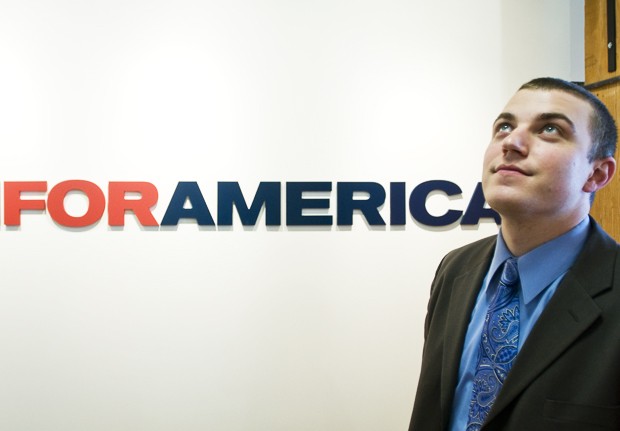Teach for America, a popular program for college graduates, is in danger of losing its direct federal funding due to a proposal before Congress. The proposal, which falls under a revised version of the Elementary and Secondary Education Act, would not guarantee money to any particular group. It would require TFA âÄî a national program that places college graduates in teaching positions at high-need K-12 schools âÄî and other similar organizations to compete for $235 million in grants. Overall, 140 University of Minnesota students have participated in the program or are currently participating. Political science and history major Alex Tenenbaum was accepted and will teach for the program this fall. âÄúI canâÄôt see myself being a permanent teacher,âÄù Tenenbaum said, âÄúso [TFA] is a great opportunity to get out of my comfort zone into a totally different culture and make a difference for those two years.âÄù TFA participants make a two-year commitment to teach in one of 35 different urban or rural areas nationally, said Aneesha Sethi, campus campaign coordinator for TFA at the University. Participants donâÄôt have to be education majors, she said, and they go through a five-week âÄúboot campâÄù before placement. This year, 225 students from the University applied to join TFA, up 38 percent from last year, Kaitlin Gastrock, spokeswoman for TFA, said. Nationally, the program has seen record numbers of both applicants and schools requesting TFA teachers this year. âÄúRecruitment numbers have been skyrocketing,âÄù Sethi said. âÄúPeople see the program as a prestigious and noble thing, and itâÄôs getting really competitive to get into.âÄù TFA asked Congress for $50 million for fiscal year 2011, up from the $21 million it received this year. The increase in requested funding was to help with TFAâÄôs planned expansion, which includes doubling the number of schools it serves within the next five years, Gastrock said. TFA, which added the University to its program in June 2009, has received federal funding every year since its inception in 1990. The proposed program before Congress could make it possible for TFA to get at least, if not more than, its requested $50 million because the grants will be awarded to high-performing programs, U.S. Secretary of Education Arne Duncan said in a press release. TFA would likely be able to get funding from the grant program, but the concern is more about uncertainty, said Daniel Sellers, executive director of TFA in the Twin Cities. âÄúThe issue is actually about timing,âÄù Sellers said. âÄúWe werenâÄôt aware when we began the fiscal year that we were going to have to compete for funding, and for a company as large and expansive as ours, itâÄôs difficult to plan without a sense of how much money weâÄôll have.âÄù Sellers said TFA has been encouraging program alumni, lawmakers, communities with TFA participants in addition to corporate and individual donors to ask the federal government to fund TFA. âÄúWeâÄôre really trying to rally support, because Teach for America has a lot of stakeholders,âÄù Sellers said. âÄúWeâÄôre trying to get support anywhere and everywhere we can get it.âÄù A total of 86 representatives and senators, all Democrats except for one, have expressed written support for direct funding to TFA, including U.S. Rep. Keith Ellison, D-Minn. âÄúAt the end of the day, we have to invest in education,âÄù Ellison said. âÄúTeach for America is helping us to eliminate inequity by getting our nationâÄôs most promising young leaders on the case.âÄù

Image by Matt Mead
Daniel Sellers is the executive director for the Teach For America program in the Twin Cities. TFA asked Congress for $50 million for fiscal year 2011, up from the $21 million it received this year.
Teach for America fights for direct funding
TFA and similar organizations may soon have to compete for $235 million in grants.
Published April 8, 2010
0
More to Discover







